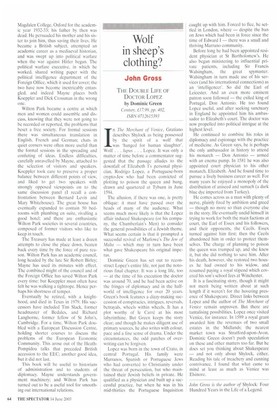Wolf in sheep's clothing?
John Gross
THE DOUBLE LIFE OF DOCTOR LOPEZ by Dominic Green Century, £17.99, pp. 402, ISBN 0712615393 In The Merchant of Venice, Gratiano describes Shylock as being possessed by the spirit of a wolf that was 'hanged for human slaughter'. Wolf . . . lupus . . . Lopez. It was only a matter of time before a commentator suggested that the passage alludes to the downfall of Elizabeth I's personal physician. Rodrigo Lopez. a Portuguese-born crypto-Jew who had been convicted of plotting to poison the queen and hung, drawn and quartered at Tyburn in June 1594.
The allusion, if there was one, is pretty oblique: it must have passed over the heads of many of the audience. What seems much more likely is that the Lopez affair induced Shakespeare (or his company, the Chamberlain's Men) to consider the general possibilities of a Jewish theme. What seems certain is that it prompted a successful revival of Marlowe's The Jew of Malta — which may in turn have been what gave Shakespeare his original impetus.
Dominic Green has set out to reconstruct Lopez's entire life, not just the notorious final chapter. It was a long life, too — at the time of his execution the doctor was around 70, and he had been active on the fringes of diplomacy and in the halfworld of intelligence for over 20 years. Green's book features a dizzy-making succession of conspiracies, intrigues, reversals, betrayals, wheels within wheels. It has a plot worthy of le Carre at his most labyrinthine. But Green keeps the story clear; and though he makes diligent use of primary sources, he also writes with colour, pace and a fine sense of drama. Under the circumstances, the odd patches of overwriting can be forgiven.
Lopez was born in the town of Crato, in central Portugal. His family were Marranos, Spanish or Portuguese Jews who had converted to Christianity under the threat of persecution, but who maintained their Jewish beliefs in private. He qualified as a physician and built up a successful practice, but when he was in his mid-thirties the Portuguese Inquisition caught up with him. Forced to flee, he settled in London, where — despite the ban on Jews which had been in force since the time of Edward I — there was a small and thriving Marrano community.
Before long he had been appointed resident physician at St Bartholomew's. He also began ministering to influential private patients, including Sir Francis Walsingham, the great spymaster. Walsingham in turn made use of his services (and his international connections) as an Intelligencer'. So did the Earl of Leicester. And an even more eminent patron soon followed — the exiled king of Portugal, Don Antonio. He too found Lopez useful, and after seeking sanctuary in England he appointed him his ambassador to Elizabeth's court. The doctor was now propelled into political intrigue at the highest level.
He continued to combine his roles in diplomacy and espionage with the practice of medicine. As Green says, he is perhaps the only ambassador in history to attend his monarch — Don Antonio — armed with an enema pump. In 1581 he was also appointed court physician to his other monarch, Elizabeth. And he found time to pursue a lively business career as well. For many years he enjoyed a monopoly of the distribution of aniseed and sumach (a dark blue dye imported from Turkey).
He comes across as a man with plenty of nerve, plainly fired by ambition and greed — though no more so than everyone else in the story. He eventually undid himself in trying to work for both the main factions at court, the Earl of Essex and his followers, and their opponents, the Cecils. Essex turned against him first: then the Cecils abandoned him in order to protect themselves. The charge of planning to poison the queen was trumped up, and she knew it, but she did nothing to save him. After his death, however, she restored two houses he had owned to his widow, and resumed paying a royal stipend which covered his son's school fees at Winchester.
It is a fascinating story, though it might not merit being written about at such length if it weren't for the hovering presence of Shakespeare. Direct links between Lopez and the author of The Merchant of Venice remain unproven. But there are tantalising possibilities. Lopez once visited Venice, for instance. In 1589 a royal grant awarded him the revenues of two small estates in the Midlands; the nearest market town was Stratford-upon-Avon. Dominic Green doesn't push speculation on these and other matters too far. But he does set you thinking about Shakespeare — and not only about Shy-lock, either. Reading his tale of treachery and cunning contrivance, I found that what came to mind at least as much as Venice was Elsinore.
John Gross is the author of Shylock: Four Hundred Years in the Life of a Legend.


































































































 Previous page
Previous page